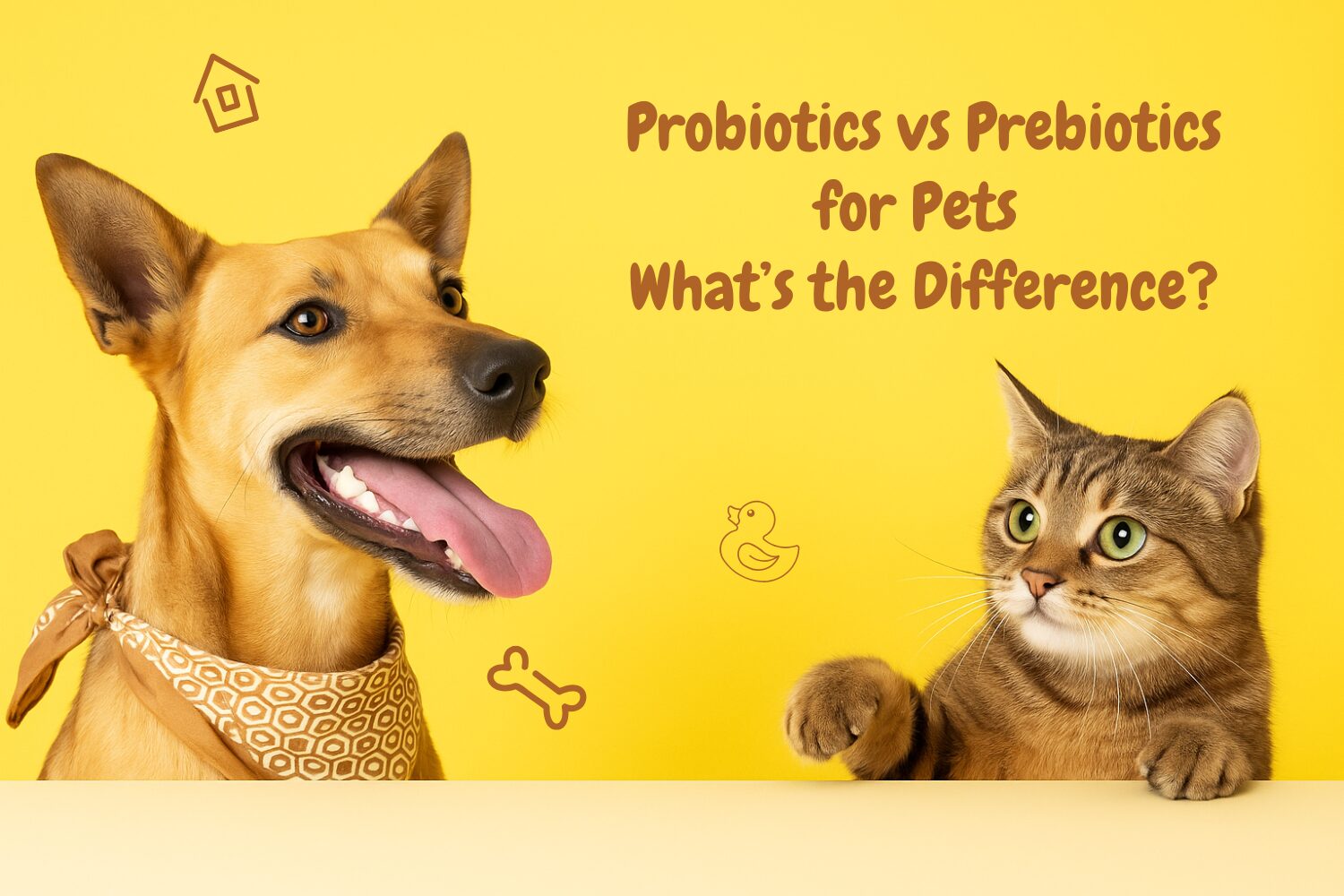Gut health is crucial to your pet’s overall wellness, from digestion to immunity and mood. But when it comes to supporting their gut, many pet parents get confused between two similar-sounding terms: probiotics and prebiotics.
Both are important. But they’re not the same.
Let’s break it down in simple terms and help you choose your furry friend’s proper gut health support.
What Are Probiotics?
Probiotics are live, beneficial microorganisms – often called “good bacteria” – that help balance your pet’s gut microbiome.
When pets face digestive upsets (like diarrhea, flatulence, or antibiotic after-effects), it usually means the gut flora is disturbed. Probiotics help restore this balance.
Role of Probiotics in Pet Digestion
- Improve nutrient absorption
- Reduce harmful bacteria in the intestines
- Strengthen the gut lining
- Support immune function
When Are Probiotics Useful for Pets?
- After antibiotic treatment
- During or after a stomach infection
- For pets with sensitive stomachs
- During stress, travel, or dietary changes
Common pet probiotic strains include Lactobacillus acidophilus, Bifidobacterium, and Saccharomyces boulardii – all found in Neobiotic DFM
What Are Prebiotics?
Prebiotics are non-digestible fibres that act as food for probiotics. They don’t contain live bacteria – instead, they help the good bacteria already present in the gut to grow and thrive.
You can think of prebiotics as the fertilizer that helps probiotics flourish.
Common Prebiotic Sources for Pets
- Chicory root
- Inulin
- Mannan oligosaccharides (MOS)
- Certain grains and vegetables
These fibres pass through the digestive tract untouched and feed the helpful bacteria in the colon, promoting smoother digestion and regular bowel movements.
Key Differences: Probiotics vs Prebiotics for Dogs
| Feature | Probiotics | Prebiotics |
| What they are | Live beneficial bacteria | Non-digestible fibres (food for bacteria) |
| Function | Add good bacteria to the gut | Feed and support good bacteria |
| Form | Capsules, powders, chews | Often added to foods or combined with probiotics |
| When needed | Digestive upset, antibiotics, stress | Daily gut support, chronic sensitivity |
| In GenextPet products? | Yes – Neobiotic DFM contains 6 strains | Yes – Contains MOS and fibres for balance |
Do Pets Need Both Prebiotics and Probiotics?
Yes – and here’s why:
While probiotics introduce good bacteria, prebiotics feed them. Using both together creates a synergistic effect, often referred to as synbiotics.
This dual approach helps:
- Improve gut flora more effectively
- Support long-term digestive health
- Strengthen immune response
- Reduce inflammation and gas
Neobiotic DFM is a supplement that combines probiotics and prebiotics, offering complete gut health support in one daily dose – ideal for dogs and cats.
Read: How to Improve Your Dog’s Gut Health Naturally
How to Choose the Right Gut Health Supplement for Pets
When picking a digestion aid, look for:
- Multi-strain probiotics (not just one type)
- Prebiotics like MOS or inulin
- Pet-specific formulation (human probiotics aren’t suitable)
- Veterinary backing or clinical evidence
Always read the label carefully. Supplements like Neobiotic DFM contain a thoughtfully balanced blend designed for Indian pet needs – especially useful during weather shifts, street-food accidents, or antibiotic recovery.
Final Thoughts: Nurture Your Pet’s Gut the Smarter Way
Understanding the difference between probiotics and prebiotics helps you make more intelligent choices for your dog’s or cat’s health. Both are essential – and when combined, they offer a powerful tool to boost digestion, immunity, and comfort.
Whether your pet is recovering from an illness, dealing with stomach issues, or needs daily digestive support, giving their gut the right bacteria and the fuel to grow is a game-changer.
Can I give my dog both probiotics and prebiotics at the same time?
Yes, and it’s encouraged. Prebiotics feed the probiotics, helping them grow and support better digestion.
How do I know if my dog needs a gut health supplement?
Look for signs like loose stools, gas, bad breath, low appetite, or frequent infections; these may signal gut imbalance.
Are probiotics and prebiotics safe for puppies and kittens?
Yes, when given in age-appropriate formulations. Products like Neobiotic DFM are suitable for all life stages.
How long does it take for probiotics to work in dogs?
You may see improvements in digestion within 3–5 days. However, long-term benefits appear with consistent use.
Can I give homemade curd instead of probiotics?
Curd offers limited strains and may not survive your pet’s stomach acid. Vet-formulated supplements provide more reliable results.
Does GenextPet have a supplement with both prebiotics and probiotics?
Yes! Neobiotic DFM combines 6 probiotic strains with MOS and digestive enzymes, a complete gut support solution for dogs and cats.
Q
Q
T
About Author
Dr. Kevin Modi
Dr. Kevin Modi is a trusted voice in the Indian pet care space, with years of hands-on experience in pet wellness, gut health, and natural supplements. At GenextPet, he guides product formulation and ensures content accuracy, drawing from real-world insights and the latest research. His goal? To simplify pet health for every dog and cat parent.


